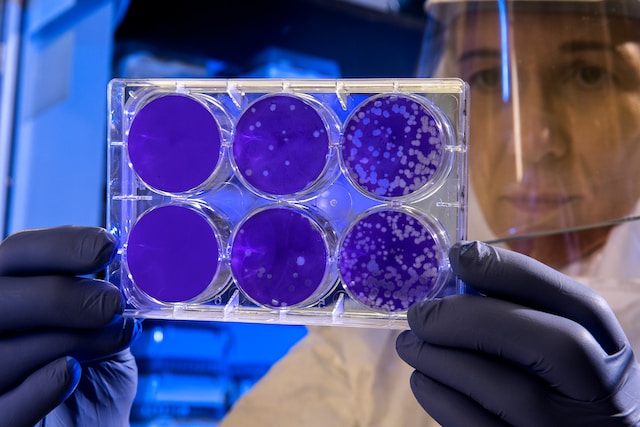

Mattias Bernardow, in a small lab in Stockholm is creating a modern marvel. He’s making stem cells — lots of them — to treat everything from cardiovascular disease to cancer, Type 1 diabetes to Alzheimer’s and Parkinson’s. Mattias Bernow is making stem cells in large quantities to treat everything from heart disease to cancer to Type 1 diabetes, Alzheimer’s, Parkinson’s, and Covid. “It’s medicine with artificial intelligence,” Bernow says, as he takes a lab tour wearing a white jacket and clogs. The stem cells will listen to signals sent by the body before deciding what treatment is required for the patient. For example, a person with heart disease may have the cells injected directly into their heart muscle. He said that these cell treatments could be used to treat chronic diseases in the same way antibiotics were used for infectious diseases.
What is the problem? The difficulty and cost of obtaining stem cells that are high quality is prohibitive. Businesses like Bernow’s are trying to change that.
Stem Cells Available to All
Bernow is CEO of Cellcolabs. The stem cell company was founded in 2021 by Per Btelson a healthtech entrepreneur with extensive experience, Norrsken a foundation that focuses on impact, and Katarina le Blanc, professor of clinical stem cells at the Karolinska institute in Stockholm.
Cellcolabs aims to reduce the cost of cell treatments that are cutting edge by mass producing stem cells. The process is difficult; stem cells are removed from the patient, frozen and monitored before being ready for a new patient. The goal is for the middle class patients to be able to afford the treatments and to allow major clinical studies to take place that could lead to a widespread acceptance of stem cell use in medical care.
He claims that “if you’re a National Hockey League pro or a movie actor, you can afford to get cell therapy in Mexico, Bahamas or Panama but it would cost tens and thousands of Euros.” Middle-class people are expected to be able pay for the treatment themselves, no matter where they live.
Cellcolabs plans to use 10-15 healthy young bone marrow donor to produce 1,000-2,000 batches of high-quality cells in its lab. The lab consists of six brightly lit rooms. The stem cells from 50 ml bone marrow are isolated, then stored in small containers and multiplied. Quality is checked on the batches before they go through controlled cryopreservation. The cells are frozen to a temperature just below zero degrees Celsius, just before shipping. Cellcolabs plans to produce 1,000-2,000 batches of high-quality cells per year with the help of 10 to 15 young, healthy donors of bone marrow. The lab consists of 6 gleaming, sterile rooms.
Cellcolabs has begun its own clinical trials in Abu Dhabi, focusing on age-related frailty and osteoarthritis of the knee. It will soon begin a study in Bahamas to prevent sports injuries and diseases. It also has clients that use the cells for fields such as fundamental research or creating medications, which include those for neurological ailments. Bernow believes that it will speed up the time until stem cells can be used more often to treat patients. This is because the price of the cells and their accessibility for research has been lowered.
The Norrsken Foundation and several angel investors have invested EUR4million in the business, including Johannes Schildt and Fredrik Helm, co-founders at Voi and Kry.
TreeFrog Therapeutics is also engaged in the manufacture of stem cells in bioreactors. TreeFrog initially focused on induced-pluripotent stem cells. These cells can be reprogrammed to an embryonic stage from skin cells or blood cells and then developed into any kind of cell needed for therapeutic purposes. They can be stimulated into developing neurons for neurological disorders, blood cells for leukemia patients or cells that cure diabetes. It ran into a problem that many cell manufacturers are experiencing: cells are living organisms and are therefore extremely fragile. A bioreactor could cause damage to many cells.
TreeFrog’s biomimetic coating technique allows it to produce large volumes of any cell type without compromising quality. After raising $75 million to improve its technology in September 2021, TreeFrog is now collaborating with selected partners to develop internal cell treatments. One of these collaborations is with a Japanese company that helps in the encapsulation NK cells (also known as killers cells) which are used for cancer treatment.
It is also developing its own internal clinical programs to treat Parkinson’s. The first will be tested in humans by 2025. TreeFrog CEO Frederic Desdouits said, “We are unique in that we can grow neurons in vitro in order to inject them into the brains and spinal cords of rats.”
Ethical Concerns
TreeFrog, Cellcolabs and other regional medical products authorities have now been granted a GMP label that allows them to sell their cells to external partners. Adult cell transplant therapies may not be as common as they could, partly because people associate them with more controversial fields of medical research. Bernow says that the moral issues surrounding the use and cloning of embryos have cast a dark shadow on the entire industry.
Cellcolabs uses stem cells from young, healthy people and is not affected by ethical dilemmas. However, he believes that this skepticism hinders the growth of the industry. He believes more stem cell treatments will be available when there is more clinical research. The progress in Europe is very slow.
“Neither the FDA (US regulatory authority) nor the EMA are recognized as being the fastest. Bernow says that although regulatory slowness is a valid reason, [stem cells] derived from bone marrow have been studied over 20 years and no serious adverse effects are known. The author says that he hopes the regulation will be changed once enough clinical studies have been conducted to demonstrate the benefits of using these stem cells.
TreeFrog, Cellcolabs and other companies are also focused on cell production. Ori Biotech, MicrofluidX and Ori Biotech are also players in the cell production space.
LifeWave is a US-based company that has made an even more fascinating discovery. According to founder David Schmidt they have created a patch which, when applied, rejuvenates a person’s natural stem cells. Our bodies produce almost no stem cells after age 50.
The stem cell patches can be purchased by the public without a prescription.





